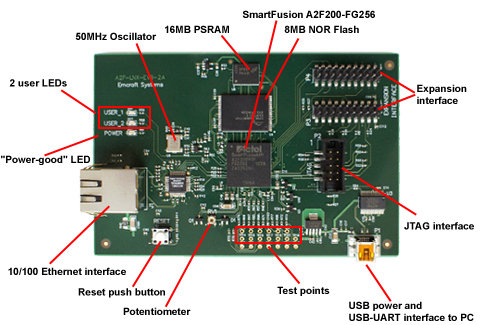There are plenty of low cost Linux development boards based on Cortex A8 or A9 such as the Beaglebone, as well as some devkits based on ARM7 and ARM9 such as SAM9 development kits , but if your application is cost and/or energy sensitive you can also switch to micro-controllers using Cortex M3 or M4 based development boards such as Emcraft SmartFusion devkits. You can run a functional uCLinux system with 1MB of RAM and 1MB of flash including the TCP/IP stack.

You need to use uClinux and not directly Linux, because the Cortex M3 doess not have a Memory Management Unit (MMU) and only a Memory Protection Unit (MPU). This can bring some interesting software development challenges such as (apparently random) kernel panics, the lack of fork, memory fragmentation and more. You can check out http://kernel.org/pub/linux/libs/uclibc/Glibc_vs_uClibc_Differences.txt for the main differences between uClibc and Glibc.
The instructions to patch and build the Linux kernel for Cortex M3 are available at LinuxM3 page. It supports Keil’s Microcontroller Prototyping System (64MB NOR Flash, 8MB SSRAM) available at http://www.keil.com/mps/default.asp. The software is comprised of the linux kernel, busybox, and the initramfs. They are all compiled using CodeSourcery GCC ARM Toolchain.
If you use one the EmCraft Cortex M3 development boards based on Actel SmartFusion (149 USD), you will get the Linux Board Support Package (BSP) for the board you purchased. EmCraft also sells Linux BSP (for 99 USD – software only) for STMicroelectronics STM32F2, NXP NXP LPC1788 (Cortex M3) and Freescale Kinetis (Cortex M4) development boards.
If you just want to play around, most of those board will be fairly expensive starting at several hundreds of dollars to nearly one thousand dollars. There also some low cost Cortex-M boards such as the STM32F4-Discovery board available for around 15 USD, but there is unfortunately not enough RAM (192KB) to be able to run uClinux.
So if you are a hobbyist, you’d probably better stick to boards such as Beagleboard or Raspberry Pi , but if you want to develop and mass-produce a real product, Cortex M3/M4 based devices running uClinux are definitely an option. If you can find a cheap Cortex-M dev board with 1MB or more RAM that costs less than 100 USD, let me know in the comment section.

Jean-Luc started CNX Software in 2010 as a part-time endeavor, before quitting his job as a software engineering manager, and starting to write daily news, and reviews full time later in 2011.
Support CNX Software! Donate via cryptocurrencies, become a Patron on Patreon, or purchase goods on Amazon or Aliexpress




